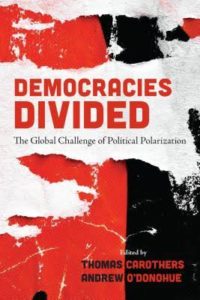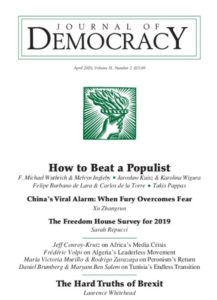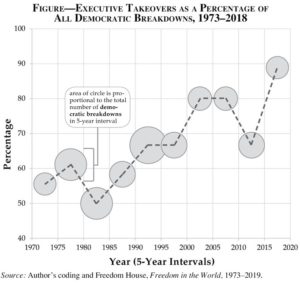Reuters Institute analyst J. Scott Brennen draws on sample of 225 pieces of misinformation rated false or misleading by fact-checkers, drawn from a collection maintained by First Draft, to explain (above) how COVID-19 misinformation is created and shared worldwide.
Viktor Oban’s ‘coronavirus coup‘ in Hungary was a warning signal. European democracies must learn the lessons of the Marshall Plan: assistance without strategy and funding without values cannot produce lasting positive impact, notes a new paper from the European Stability Initiative, The wizard, the virus and a pot of gold: Viktor Orban and the future of European solidarity:
An even more important question than how much funding is mobilised is the question what this funding is for. As Europeans debate new tools of solidarity, they must find ways to confront opponents of the values enshrined in their treaties. And do so not with pious words and empty threats, but in the language of power and money that politicians like Orban can understand.
 On the one hand, a grave public health emergency may draw a country together and give leaders a chance to rise above and even heal chronic partisan divides. Yet on the other, heightened public anxiety, strained governance capacities, and the differential impact of the virus on particular groups may exacerbate long-standing fissures. What is the balance sheet so far? the Carnegie Endowment’s Thomas Carothers and Andrew O’Donohue, a research fellow at the Istanbul Policy Center ask.
On the one hand, a grave public health emergency may draw a country together and give leaders a chance to rise above and even heal chronic partisan divides. Yet on the other, heightened public anxiety, strained governance capacities, and the differential impact of the virus on particular groups may exacerbate long-standing fissures. What is the balance sheet so far? the Carnegie Endowment’s Thomas Carothers and Andrew O’Donohue, a research fellow at the Istanbul Policy Center ask.
They address the question through ten country case studies (see below), focused primarily on countries already beset by severe political and societal polarization, including India, Poland, Sri Lanka, Thailand, Turkey, and the United States. But some examine other types of cases, either where deep-seated divisions appeared to be in flux (as in Kenya) or where polarization, though previously on the rise, was still only incipient (as in Brazil, Chile, and Indonesia), they write in Polarization and the Pandemic.
The most common—and concerning—pattern is one in which the pandemic reinforces existing partisan divides and further strains democratic institutions. In these countries, divisive political leadership is the primary factor escalating polarization, they observe:
- First, the pandemic has provided fresh fodder for attacking foreign enemies, the media, and other favored punching bags…..
- Another common polarizing leadership tactic is to exclude the opposition from the crisis response. ….
- Yet another way leaders have stoked polarization is by stripping the opposition of its powers at the local or state levels. ….
On the subject of polarization….
“Electoral competition often confronts voters with a choice between two valid but potentially conflicting concerns: democratic principles and partisan interests,” Milan Svolik argues in “Polarization versus Democracy,” an article for the NED’s Journal of Democracy.
Heightened partisanship in the pandemic context also has wide-ranging negative ramifications for democracy, add Carothers and O’Donohue, co-authors of the recent book, Democracies Divided:
- For one, it frequently results in emergency measures that undermine political freedoms. In Indonesia, the government has given police the power to arrest citizens who criticize any public official in relation to the pandemic. ….
- Furthermore, the pandemic creates opportunities for illiberal governments to manipulate electoral processes. In Poland, the ruling party has refused to postpone the presidential election this May despite public health concerns, because its candidate, the incumbent president, has a tremendous political advantage amid the pandemic. …
- Finally, at the societal level, the pandemic is aggravating tensions between majority and minority communities, fueling intolerance and even violence against the latter. In Sri Lanka, voices in the media and on online platforms have spread a hateful narrative that blames the country’s Muslim minority for the spread of the virus.
 It is not too late for political elites and civic actors around the world to find opportunities in the crisis to reduce divisions and break away from old patterns of reflexive partisanship, they conclude. But doing so will require raising both sightlines and political standards—a hard task at any time, but all the more difficult in the midst of an emergency ripe for partisan manipulation. RTWT
It is not too late for political elites and civic actors around the world to find opportunities in the crisis to reduce divisions and break away from old patterns of reflexive partisanship, they conclude. But doing so will require raising both sightlines and political standards—a hard task at any time, but all the more difficult in the midst of an emergency ripe for partisan manipulation. RTWT
-
Brazil: Polarizing Presidential Leadership and the Pandemic, MATIAS SPEKTOR
-
Chile: A Fleeting Respite from Protests and Polarization, ANDREAS E. FELDMANN
-
India: Infections, Islamophobia, and Intensifying Societal Polarization, NIRANJAN SAHOO
-
Indonesia: Polarization, Democratic Distress, and the Coronavirus, EVE WARBURTON
-
Kenya: Elite Clashes and Coronavirus Quarrels, GILBERT M. KHADIAGALA
-
Poland: How Populists Have Exploited the Coronavirus, JOANNA FOMINA
-
Sri Lanka: Elections, Polarized Politics, and the Pandemic, AHILAN KADIRGAMAR
-
Thailand: Shared Frustrations, Enduring Divisions, JANJIRA SOMBATPOONSIRI
-
Turkey: Deepening Discord and Illiberalism Amid the Pandemic, SENEM AYDIN-DÜZGIT
-
The United States: Presidential Leadership, Polarization, and the Coronavirus, THOMAS CAROTHERS








